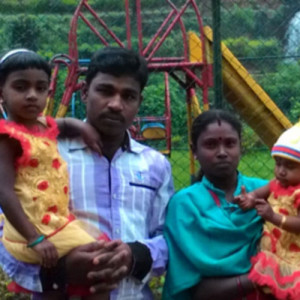Visión Mundial de Lanka Programa de desarrollo del área de Nuwara Eliya (ADP) Desde enero de 2015, MenCare lleva a cabo programas para hombres y sus familias en la comunidad de plantaciones de Sri Lanka para promover la igualdad de género y el bienestar familiar. Como parte de la educación grupal para padres, los padres jóvenes de entre 25 y 40 años participan en 11 sesiones de educación grupal y sus familias se reúnen en retiros y en una ceremonia de graduación al finalizar el programa.
El programa de Sri Lanka ha tenido un gran éxito en el cambio de las normas en torno al género y la violencia. Entre los padres jóvenes que completaron las sesiones de capacitación para padres de MenCare en el ADP de Nuwara Eliya:
- 76% han reducido su consumo de alcohol;
- 72% está totalmente de acuerdo con la importancia de planificar el futuro de sus hijos;
- 72% dedica tiempo a apoyar la educación de sus hijos;
- 72% elaborar presupuestos mensuales conjuntamente con sus socios; y
- 51% apoyan a sus parejas en las actividades del hogar.
Christopher es un padre que aprendió la importancia de involucrarse después de participar en MenCare:
 Christopher es un padre de 30 años que trabaja a jornal en el sector de las plantaciones de Sri Lanka. Su esposa, Vijayakala, trabaja en la misma finca. Ambos trabajan duro para ganarse la vida. Pero Christopher solía gastar su salario en alcohol, lo que era un tema polémico en su familia. En muchas ocasiones, Christopher y Vijayakala no tenían suficiente dinero para cubrir sus necesidades básicas. Vijayakala a menudo se preocupaba por el futuro y le explicó muchas veces a Christopher las consecuencias del alcohol.
Christopher es un padre de 30 años que trabaja a jornal en el sector de las plantaciones de Sri Lanka. Su esposa, Vijayakala, trabaja en la misma finca. Ambos trabajan duro para ganarse la vida. Pero Christopher solía gastar su salario en alcohol, lo que era un tema polémico en su familia. En muchas ocasiones, Christopher y Vijayakala no tenían suficiente dinero para cubrir sus necesidades básicas. Vijayakala a menudo se preocupaba por el futuro y le explicó muchas veces a Christopher las consecuencias del alcohol.
Como Christopher es un líder comunitario, se le asignó la responsabilidad de organizar a los padres jóvenes para que participaran en las clases de paternidad de MenCare. Una vez que comenzaron las clases, Christopher también comenzó a participar. Participó activamente en todo el programa con interés, dándose cuenta de que él también tenía la capacidad de cambiar su comportamiento para su propio beneficio, el de sus hijos y el de su esposa. Pudo conectarse a nivel personal con cada una de las 11 sesiones, reflexionando sobre sus acciones pasadas y comprometiéndose a adoptar otras más equitativas en el futuro.
Después de completar el programa MenCare, Christopher fue reconocido durante la ceremonia de graduación de MenCare frente a todos los invitados. Estaba orgulloso de su compromiso de convertirse en un compañero y padre más involucrado y responsable en el hogar.
“El programa MenCare cambió mi perspectiva general sobre el matrimonio y el valor de tener una familia con hijos encantadores. Ahora ya no seguimos discutiendo, nos escuchamos unos a otros para resolver los problemas”.
“Mi esposa y yo solíamos discutir mucho sobre cuestiones muy menores; nunca nos escuchábamos ni respetábamos las opiniones del otro. El programa MenCare cambió mi perspectiva general sobre el matrimonio y el valor de tener una familia con hijos encantadores. Ahora ya no seguimos discutiendo, nos escuchamos para resolver los problemas”, dijo Christopher después de la ceremonia.
“Antes me levantaba tarde por la mañana, pero ahora me levanto temprano por la mañana cuando se levanta mi esposa y la ayudo en la cocina. Ya no golpeo a mis hijos, como antes, cuando me pedían juguetes u otras cosas. Ahora mi hija está mucho más cerca de mí”, añadió Christopher.
“Yo ganaba 7.500 rupias al mes [aproximadamente 1,4 billones de dólares estadounidenses]; le daba 5.000 rupias a mi esposa y guardaba 2.500 rupias para consumir alcohol y fumar durante el mes. Dejé de fumar por completo. Le dije a mi esposa que el mes siguiente trabajaría por 10.000 rupias y que si ella también trabajaba por 10.000 rupias, entonces ganaríamos 20.000 rupias juntos. Y así lo hicimos. Nos sentamos juntos y decidimos hacer un presupuesto de nuestros gastos para el mes siguiente. Nuestro presupuesto [de gastos] para el mes era de 12.500 rupias y nos quedaba un saldo de 7.500 rupias. Pagué todas mis deudas y compré una cocina de gas para mi esposa con esos ahorros. Fue increíble. Nunca me imaginé cómo me cambiaría el programa MenCare”, concluyó.